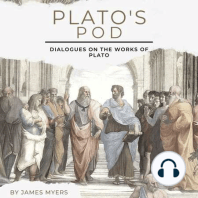120 min listen

Plato's Protagoras, Part 3: In Virtue of What Does Good Outweigh Bad?
Plato's Protagoras, Part 3: In Virtue of What Does Good Outweigh Bad?
ratings:
Length:
112 minutes
Released:
Apr 9, 2023
Format:
Podcast episode
Description
In concluding our 3-part series on Plato’s Protagoras, a consensus may have emerged that virtue is not a universal form – but if it has no consistent definition, what is virtue, and can it be taught? Members of the Toronto, Calgary, and Chicago Philosophy Meetup groups convened on March 26, 2023 to consider the teachability of virtue, which is the subject of Plato’s dialogue. If virtue is really a form of knowledge, as Socrates concludes, then it can be taught, but that would contradict Socrates’ initial view that virtue is not teachable. Meanwhile, the position of the sophist Protagoras appears to have changed to the point where he argues that virtue is not a matter of knowledge, and so as Socrates points out, the upshot of the discussion is “topsy-turvy.” Maybe the real question, as one participant observed, “"What is the motivation of these people teaching virtue, what is the advantage...?"
Released:
Apr 9, 2023
Format:
Podcast episode
Titles in the series (59)
Dialogue on The Phaedrus (Part II): The Purpose of Speech, and its Powers in Particular by Plato's Pod: Dialogues on the works of Plato